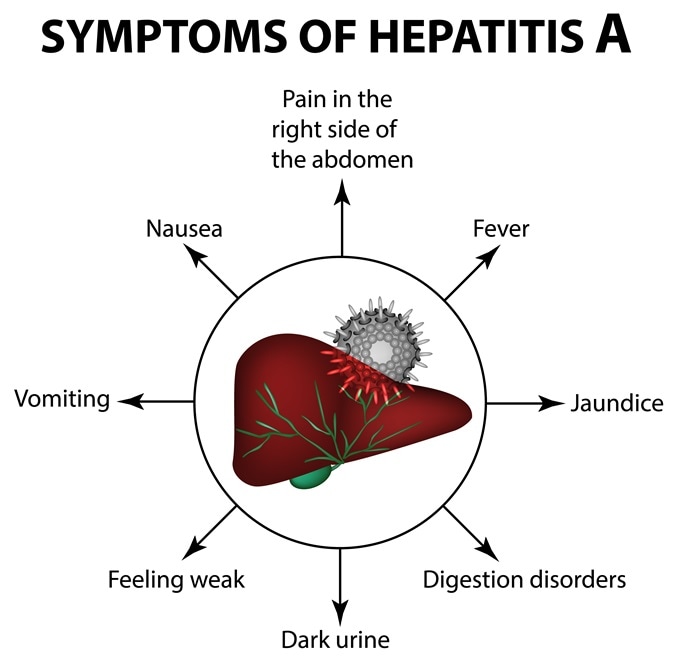The San Diego population is facing one of the worst outbreaks of infective viral disease Hepatitis A. the outbreak began last November and is still going strong with no signs of reduction in the infection rates. The homeless are one of the worst hit.
The county Health and Human Services Agency thus has requested state assistance to beef up the new sanitation measures including portable hand-washing stations and bleached-spiked water for power-washing contaminated surfaces.

Symptoms of hepatitis A. Image Credit: Timonina / Shutterstock
Dr. Wilma Wooten, the San Diego Public Health Officer explained that these sanitation precautions are following the successful footsteps of other Southern California cities - including Los Angeles in order to combat Hepatitis A spread among the population. She noted that L.A. has no local cases of Hepatitis A because of these sanitation programs in place. Thus same measures could work here too.
The first case of this outbreak was reported in November 2016. Up until last Friday (1st September 2017), more than 15 people in the area have succumbed to hepatitis infection and 379 more cases have been registered. Poor sanitation and lack of hand washing is one of the important ways of spread of Hepatitis A. Water contaminated with the stool of an infected person is the common source of hepatitis A infection. Thus unsafe water, food, inadequate personal hygiene or poor sanitation is often the cause of hepatitis A spread. The homeless population is commonly hit because of their lack of access to good and clean sanitation.
This year during summer San Diego health officials geared up to combat the spread of this infection by promoting hand washing practices and good sanitation. Thousands of doses of vaccine have been distributed to the vulnerable population since. Health awareness and education has also been bolstered to improve personal hygiene practices. Despite efforts neither the infection rates nor the number of deaths have abated.
Hepatitis A
Hepatitis A is a viral infection. It commonly affects the liver. The spread is usually mediated by contaminated food, water, poor hygiene and sanitation. Hepatitis A is more common in developing and under-developed regions in Africa and Asian countries where water scarcity and poor sanitation along with lack of awareness plays a key role.
Some of the initial symptoms of hepatitis A include diarrhea, nausea and vomiting, slight fever, body ache etc. Around ten days after these initial symptoms start, the liver may show signs of being affected. This develops into jaundice, itchy skin, dark urine, pale stools and pain over the upper right part of the abdomen. In most cases, symptoms resolve within two to six months and people usually make a full recovery. Rarely liver may be damaged leading to life threatening hepatic complications including liver failure and even death.
Hepatitis A is usually spread through the fecal-oral route. This means that food or water that is contaminated with feces of an infected person can spread the infection. Poor hygiene and hand washing practices thus is a large contributor to spread of this infection. Less commonly, hepatitis A can be transmitted when drug users share infected needles and through sexual intercourse, particularly anal sex. Those living in close quarters are often at greater risk of being mass infected.
There is no specific treatment for hepatitis A and it resolves on its own in most cases. Fever is relieved using fever medications and bed rest is advised. Medication to prevent nausea and vomiting is advised and the patient is asked to avoid alcohol and certain medications to allow the liver to heal and recover.
Spread of hepatitis A can be prevented by adopting simple measures such as hand washing after using the toilet, maintaining good personal hygiene and not sharing of towels toothbrushes etc. Infection can also be prevented if a vaccination and antibody are provided within two weeks of exposure to the virus.
References
- https://www.news-medical.net/health/What-is-Hepatitis-A.aspx
- http://www.nhs.uk/conditions/Hepatitis-A/Pages/Introduction.aspx
- https://www.cdc.gov/hepatitis/hav/havfaq.htm#general
- http://www.cdc.gov/hepatitis/a/pdfs/hepageneralfactsheet.pdf
- www.health.nt.gov.au/.../...p;siteID=1&str_title=Hepatitis%20A.pdf